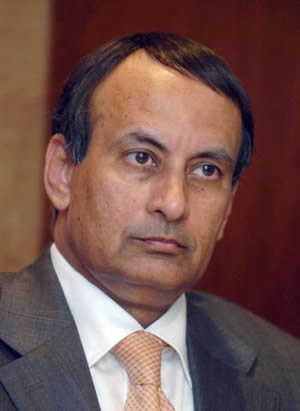
Husain Haqqani, the former Pakistani Ambassador to the United States, delivered a lecture on the U.S.-Pakistani relationship on February 4 in Luce Hall sponsored by the Jackson Institute.
The lecture, titled, “U.S.-Pakistan Relations: An Epic History of Misunderstanding,” argued that the United States should back away from Pakistan. It was based heavily on his book, Magnificent Delusions, which identified illusions on the part of both Americans and Pakistanis that underlie the chaotic relationship between the two countries.
These illusions, he found, have worked together to cause a self-perpetuating cycle – resulting in a Pakistan that is backward looking and focused on military instead of economic development.
“Pakistan saw India as an existential threat, and wanted to be equal with India in terms of their military,” Haqqani explained. “Pakistan was deluded in believing that a country in history can be an equal to another without needing to stand on its two feet.” He was referring to Pakistan’s reliance on U.S. aid since the Cold War era, when Pakistan saw its strategic location as able to attract U.S. foreign aid.
On the other hand, the American delusion was thinking that it could influence Pakistani policies by giving money. “The Pakistani military has its own world view,” Haqqani said, which was founded on its belligerence toward India. “In international relations, there’s a saying that there are no permanent enemies, just permanent interests. Pakistan, however, thinks that India is its permanent enemy.”
He listed three consequences of American aid to the Pakistani military. First, strengthening the military has caused the country to ignore the possibility of normalizing Pakistani relations with India. Haqqani argued that if Pakistan – which does not have the economic base to fund such a large military by itself – received no support, it would inevitably have to find another way to deal with its India problem.
Second, aid has caused Pakistan to become increasingly dependent on the U.S. “The more dependent a country becomes, the more resentment develops,” Haqqani said. He cited poll numbers that illustrated the mutual dislike from the people of both countries toward one another.
Third, and finally, Haqqani argued that aid has caused Pakistan to postpone its internal reform debate. Since there has been much foreign intervention in Pakistani affairs, he believes that Pakistan has not had the space nor time to develop and identify their ownnational interests.
“Because of these reasons, it is in both countries’ interests for the U.S. to back off a little, and give Pakistan some breathing room,” Haqqani concluded.
